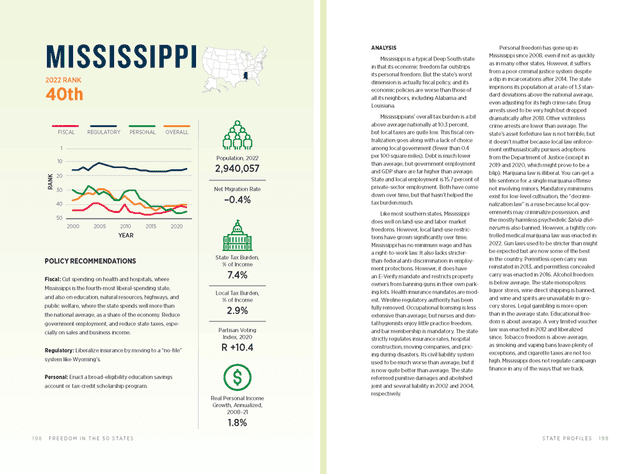Policy Recommendations
- Fiscal Cut spending on health and hospitals, where Mississippi is the fourth-most liberal-spending state, and also on education, natural resources, highways, and public welfare, where the state spends well more than the national average, as a share of the economy. Reduce government employment, and reduce state taxes, especially on sales and business income.
- Regulatory Liberalize insurance by moving to a “no-file” system like Wyoming’s.
- Personal Enact a broad-eligibility education savings account or tax-credit scholarship program.
Analysis
Mississippi is a typical Deep South state in that its economic freedom far outstrips its personal freedom. But the state’s worst dimension is actually fiscal policy, and its economic policies are worse than those of all its neighbors, including Alabama and Louisiana.
Mississippians’ overall tax burden is a bit above average nationally at 10.3 percent, but local taxes are quite low. This fiscal centralization goes along with a lack of choice among local government (fewer than 0.4 per 100 square miles). Debt is much lower than average, but government employment and GDP share are far higher than average. State and local employment is 15.7 percent of private-sector employment. Both have come down over time, but that hasn’t helped the tax burden much.
Like most southern states, Mississippi does well on land-use and labor-market freedoms. However, local land-use restrictions have grown significantly over time. Mississippi has no minimum wage and has a right-to-work law. It also lacks stricter-than-federal anti-discrimination in employment protections. However, it does have an E-Verify mandate and restricts property owners from banning guns in their own parking lots. Health insurance mandates are modest. Wireline regulatory authority has been fully removed. Occupational licensing is less extensive than average, but nurses and dental hygienists enjoy little practice freedom, and bar membership is mandatory. The state strictly regulates insurance rates, hospital construction, moving companies, and pricing during disasters. Its civil liability system used to be much worse than average, but it is now quite better than average. The state reformed punitive damages and abolished joint and several liability in 2002 and 2004, respectively.
Personal freedom has gone up in Mississippi since 2008, even if not as quickly as in many other states. However, it suffers from a poor criminal justice system despite a dip in incarcerations after 2014. The state imprisons its population at a rate of 1.3 standard deviations above the national average, even adjusting for its high crime rate. Drug arrests used to be very high but dropped dramatically after 2018. Other victimless crime arrests are lower than average. The state’s asset forfeiture law is not terrible, but it doesn’t matter because local law enforcement enthusiastically pursues adoptions from the Department of Justice (except in 2019 and 2020, which might prove to be a blip). Marijuana law is illiberal. You can get a life sentence for a single marijuana offense not involving minors. Mandatory minimums exist for low-level cultivation, the “decriminalization law” is a ruse because local governments may criminalize possession, and the mostly harmless psychedelic Salvia divinorum is also banned. However, a tightly controlled medical marijuana law was enacted in 2022. Gun laws used to be stricter than might be expected but are now some of the best in the country. Permitless open carry was reinstated in 2013, and permitless concealed carry was enacted in 2016. Alcohol freedom is below average. The state monopolizes liquor stores, wine direct shipping is banned, and wine and spirits are unavailable in grocery stores. Legal gambling is more open than in the average state. Educational freedom is about average. A very limited voucher law was enacted in 2012 and liberalized since. Tobacco freedom is above average, as smoking and vaping bans leave plenty of exceptions, and cigarette taxes are not too high. Mississippi does not regulate campaign finance in any of the ways that we track.

